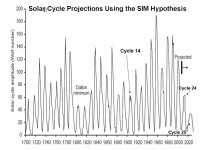By Richard Mackey, JCR
Rhodes is one of the few scientists to research the sun/climate relationship in terms of the totality of the sunís impact on the earth (i.e. gravity, the electromagnetic force and output and their interaction). When the totality of the sunís impact is considered, having regard to the relevant research published over the last two decades, the influence of solar variability on the earthís climate is very strongly non-linear and stochastic. Rhodes also researched the idea that the planets might have a role in producing the sunís variable activity. If they do and if the sunís variable activity regulates climate, then ultimately the planets may regulate it. Recent research about the sun/climate relationship and the solar inertial motion (sim) hypothesis shows a large body of circumstantial evidence and several working hypotheses but no satisfactory account of a physical sim process. In 2007 Ulysses will send information about the solar poles. This could be decisive regarding the predictions about emergent Sunspot Cycle No 24, including the sim hypothesis. According to the sim hypothesis, this cycle should be like Sunspot Cycle No 14, and be followed by two that will create a brief ice age.

The solar inertial motion hypothesis predicts that the period from about 2010 to 2040 will be one of relatively severe cold throughout the world. The hypothesis predicts that the emergent Sunspot Cycle No 24 will be quieter than Sunspot Cycle No 23 and just like Sunspot Cycle No 14, the weakest cycle in the last 100 years, which began in February, 1902 and ended in August, 1913. It would also tend to support the prediction that solar maximum of Sunspot Cycle No 25 would be much smaller than has been observed during the last 150 years or so. It would be a strong indicator of a very cold global climate ahead. Even David Hathaway of NASA has predicted this decline for solar cycle 25. Read full paper here.


